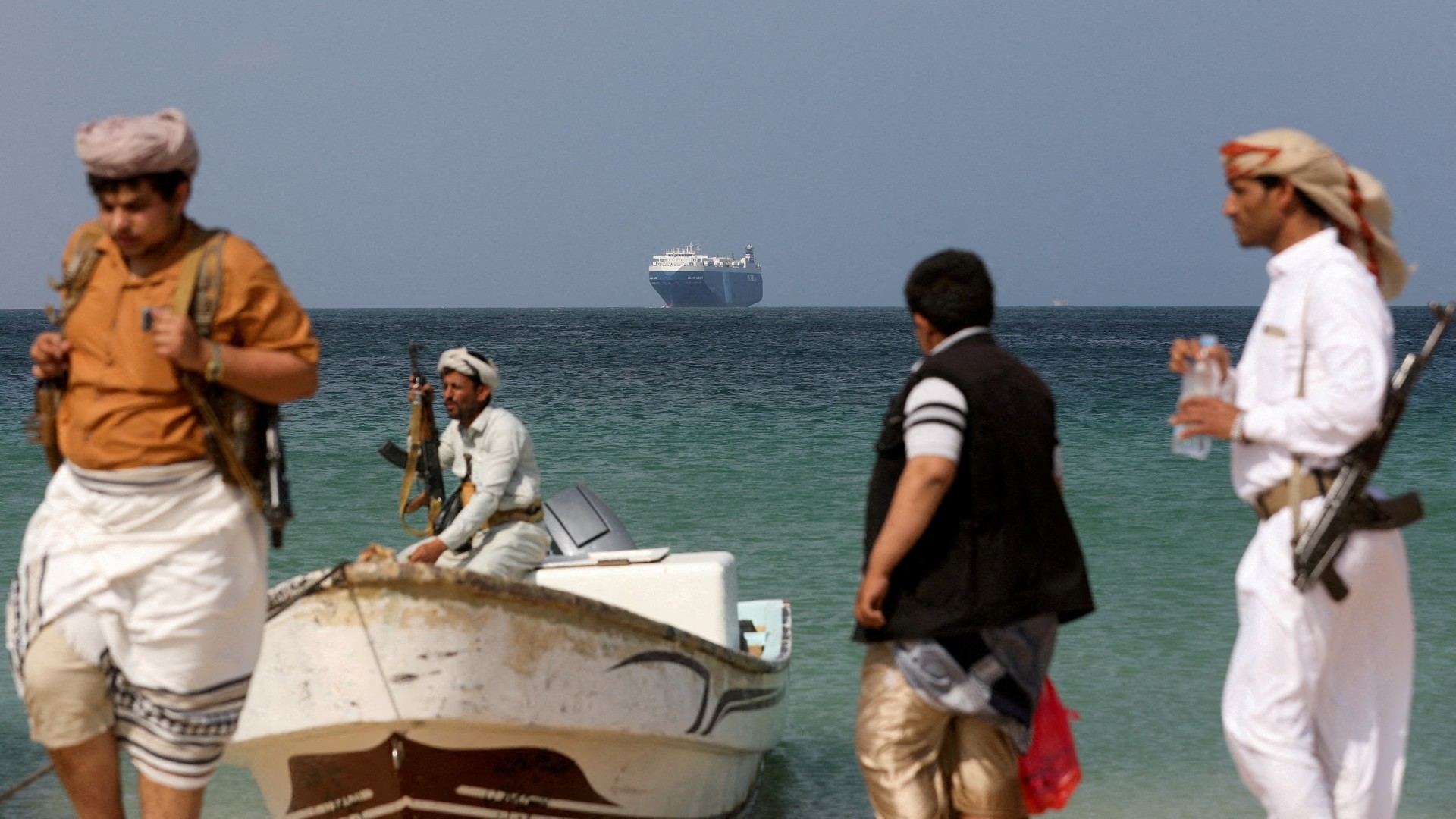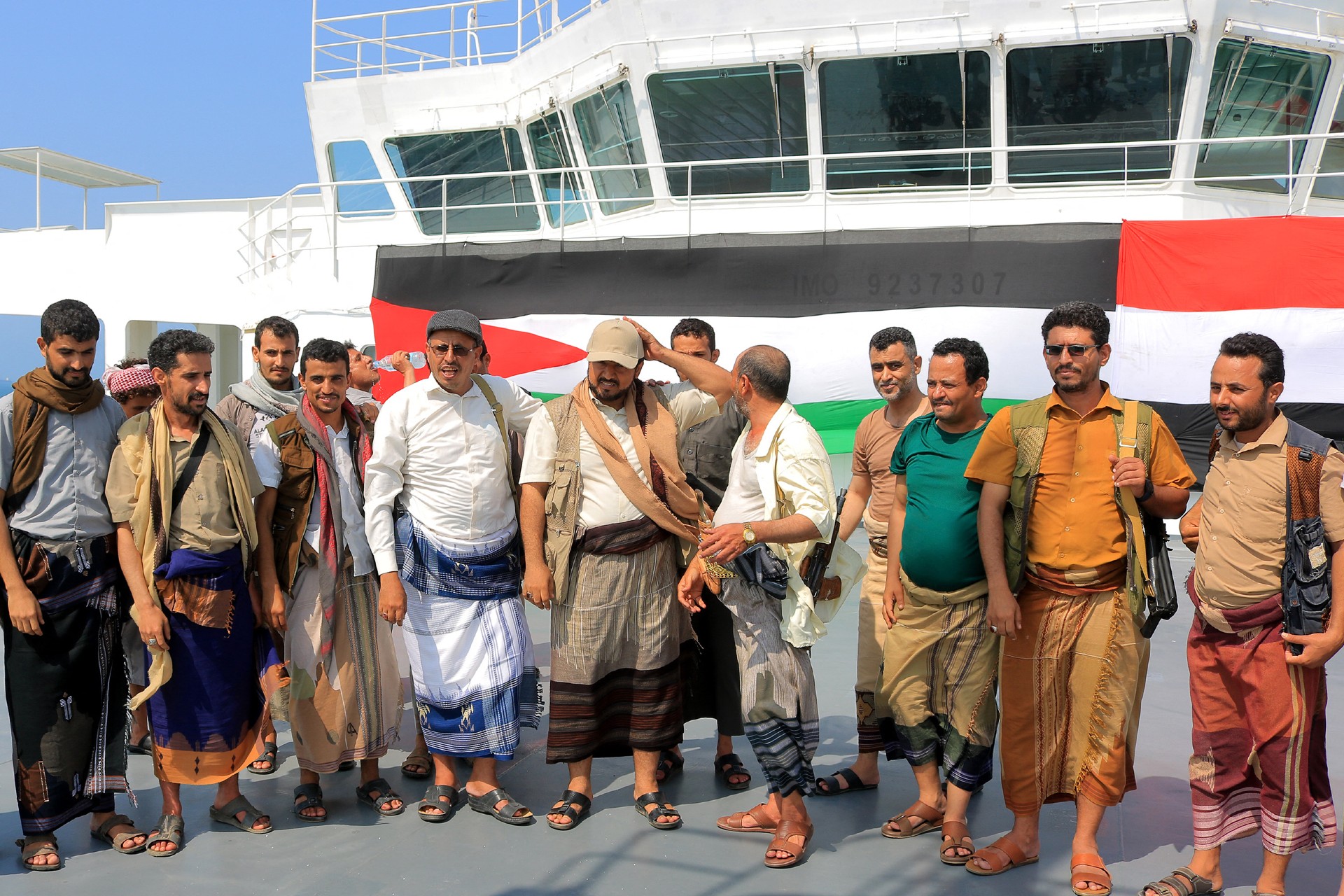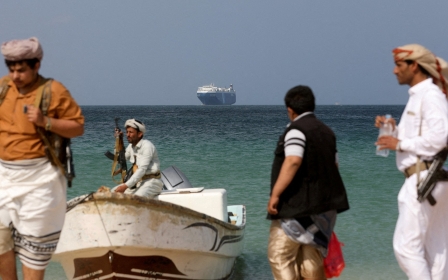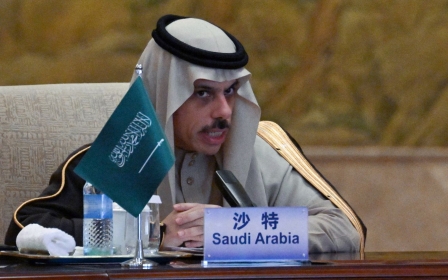Israel-Palestine war: On board the cargo ship seized by Yemen's Houthis

Zaid Hussein, 45, has driven 230km from his home in Sanaa to the Yemeni port region of Hodeidah.
He arrives from the busy capital to al-Salif, a small coastal village in a cove at one of the most western points of Yemen.
Hussein is not there to enjoy the sound of waves hitting the shore, or the serenity of the beach, picturesque as it may be.
He, along with Yemenis from all around the country, are in al-Salif to visit the Galaxy Leader, a ship seized by Yemen's Houthi forces on 19 November in the Red Sea off the coast of Hodeidah. Twenty-five of the vessel's crew members have been detained on board since then.
The Houthis have described the seizure, and subsequent attacks targeting ships it says are linked to Israel, as an act of resistance to support Palestinians in Gaza under Israeli bombardment.
Stay informed with MEE's newsletters
Sign up to get the latest alerts, insights and analysis, starting with Turkey Unpacked
Israel has called the capture of the ship an "act of terrorism", while the United States and nine of its allies have launched a naval taskforce to tackle Houthi attacks.
But in Yemen, al-Salif is bustling with celebratory local tourists hoping to climb onboard the seized cargo ship. Hussein and nine others sit on a small boat, waiting to be transported to the larger vessel.
'Israel never calculated the reaction of Yemen'
- Yasser Mohammed, Yemeni tourist
"Let us go to see the Israeli ship and take pride in our armed forces' achievement," he tells Middle East Eye.
Those on Hussein's tour group have come from Yemeni provinces far and wide, including Sanaa, Dhamar and Raymah.
A sense of anticipation and excitement takes over among the group, as the small boat stops near the ship and the tourists finally ascend via a ladder.
Yasser Mohammed, who has travelled from the northern province of Dhamar, believes that international actors have been stunned by Yemeni actions.
"When Israel began its war on Gaza, it might have been worried about the reactions of Lebanon, Egypt, Jordan, Saudi Arabia or other countries. I think it never calculated the reaction of Yemen," Mohammed, 43, told MEE, while sitting cross-legged and chewing qat on the ship's upper deck.
'Return ship if Israel reconstructs Gaza'
Mohammed debates the fate of the ship with several others at the top deck.
Israeli officials have said Galaxy Leader is British-owned and Japanese-operated. But according to public shipping databases, the vessel's ownership is linked to Ray Car Carriers, founded by Israeli tycoon Abraham "Rami" Ungar.
"The Israelis have flattened many neighbourhoods in Gaza and killed thousands of people. If Israel can give life to those it murdered and reconstruct Gaza, then this ship should be allowed to return to its Israeli owners," said Mohammed.
In recent days, the detained crew members - who hail from Bulgaria, Ukraine, the Philippines, Mexico and Romania - have been allowed limited contact with their families, according to reports.
In a publicised video by the Houthis after the ship first docked in Hodeidah, officials were seen telling the crew members that they should feel as if they were in their own countries, and ask for anything they need.
Yemeni visitors to the ship often speak with the crew members and take pictures with them.
The US, European Union and Nato put out a joint statement earlier this week describing the seizure of the ship and the detention of its 25 crew members as "appalling".
On Monday, 10 nations launched a taskforce to counter Houthi attacks. Notably, there was only one Arab state, Bahrain, named among the participants.
Analysts told MEE that the likes of Saudi Arabia and the United Arab Emirates likely did not want to jeopardise rapprochement efforts in the region, or be seen as opposing an act of Palestinian solidarity.
Over 20,000 Palestinians in Gaza have been killed by Israeli bombardment since war broke out two-and-a-half months ago.
Houthis buoyed since seizure
Not all actors in Yemen support the ship seizure: the internationally recognised government has questioned its effectiveness.
Yemen's Information Minister Muammar Al-Eryani said in a statement that the seizure of Galaxy Leader could not have any "direct or indirect impact on the brutal Israeli occupation".
'The seizure of Galaxy Leader has mobilised people and helped us attract more fighters'
- Abu Ali, Houthi soldier
Instead, he believed it was an attempt by the Houthis to legitimise the presence of foreign forces in the region's waters.
The Houthis seized Sanaa in 2014 and forced the internationally recognised government to flee to Saudi Arabia.
In March 2015, a Saudi-led coalition, which included the UAE, intervened on to push back the Houthis. The devastating war has been described as the world's worst humanitarian crisis.
For some within the Houthi ranks, the seizure of Galaxy Leader has shown to Yemenis its seriousness in confronting its foes.
"Over the past years, we have chanted 'Death to Israel'. Many Yemenis used to laugh at our motto. Today, more people are chanting it because they have come to believe in it," a Houthi soldier, identifying himself as Abu Ali, tells Middle East Eye.
"The seizure of Galaxy Leader has mobilised people and helped us attract more fighters who cannot be retained by financial rewards but by moral values. Siding with the wronged Palestinians in Gaza is one of the highest moral values," he says, as he stands with his rifle over his right shoulder on al-Salif’s beach.

Abu Ali believes that the ship seizure was proof of the Houthi leadership's independence.
"Our leadership consulted no country when it decided to take over the Israeli ship, and now no country can force us to release it overnight," he says.
As yet, no announcement has been made by the Houthis over when the ship and its crew will be freed.
While that remains, Yemeni tourists will continue to visit it in droves.
Hodeidah University even organised a field trip for its students to the ship this week, to teach them about the war on Gaza. Earlier in December, a graduation ceremony took place onboard.
"It is lovely to be in such a place and be surrounded by sea from all sides," Hussein said. "The only thing that ruins our joy here is when we remember the Israeli massacres in Gaza."
This article is available in French on Middle East Eye French edition.
Middle East Eye delivers independent and unrivalled coverage and analysis of the Middle East, North Africa and beyond. To learn more about republishing this content and the associated fees, please fill out this form. More about MEE can be found here.





